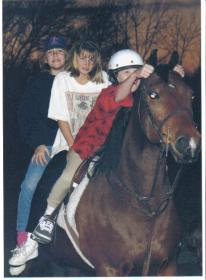I didn’t make my point very well. A great many of the current riding students that I know of don’t do any other outdoor activities. They are unfamiliar with the most ordinary perceptions of space and touch in outdoor settings.
They are unfamiliar with animals other than their domestic pets, which live in a very artificial, routine environment. Most haven’t learned to observe animals, or recognize much natural behavior.
They don’t judge space very well. They don’t know if a circle is “big” or “small”. They don’t judge the way to lead a horse – an animal as long as a sofa – with enough spacial discretion to turn it in a way that the horse can accommodate the surrounding obstacles.
Away from the barn, they must spend most of their time on-screen, because they don’t have much manual dexterity, either. For handling ropes, tack, anything really. They have never buckled a buckle - a big learning step.
Of those I personally know, a very few are engaged in other sports that broaden their adaptation to the physical world. Most are not.
They can get these experiences at the barn. But they need some time to be better oriented to a 3-dimensional world. Then they will be less dangerous to themselves and to the animals they deal with, outside.
Then it is time to do more with horses, independently. Make less lethal mistakes to learn from.



 , pick up manure in the arena, etc etc.
, pick up manure in the arena, etc etc.